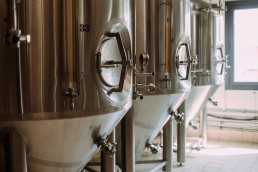The ancient art of brewing has been lost over time due to the shift to the mass production represented by traditional industrial breweries. The use of modern technology, standardised recipes, mass production through cheap interchangeable ingredients and the loss of community and culture have all contributed to the deterioration of a beer quality and taste. With the development of craft breweries and a renewed interest in traditional brewing methods, there is hope that the art of brewing will once again be celebrated and nurtured as an important part of our cultural heritage. Mass-produced beers as a generic and homogenised product will be transformed into new sophisticated products with the distinct character of locally brewed beer.
Author:
Weronika Pytel

The art of brewing beer has a long history, dating back thousands of years. In ancient times, beer brewing was often done on a small scale, using traditional methods and local ingredients. Over time, as the popularity of beer grew, the brewing process began to evolve and change.
With the growth of industrialisation in the 19th and 20th centuries, the brewing industry underwent significant changes. Traditional and small-scale breweries have been replaced by large industrial breweries that have focused on the mass production of beer using modern technology and standardised recipes. This change had a significant impact on the quality of the beer produced, as the focus shifted from a taste and craftsmanship to efficiency and profitability.
One of the main ways in which the art of brewing has been lost over time is through the use of industrial brewing equipment and automated brewing processes. This has led to a standardised approach to beer brewing, with little room for creativity and experimentation. Traditional brewing methods such as the open fermentation, barrel aging and bottle conditioning have largely been replaced by more modern techniques that put speed and efficiency ahead of quality and taste.
Another factor contributing to the disappearance of the art of brewing is the use of mass-produced ingredients such as cheap, low-quality malts and hops. These ingredients often come from large farms that prioritise quantity over quality, resulting in a bland and generic taste that lacks the complexity and depth of flavour typical of craft breweries.
Finally, the development of traditional industrial breweries has also led to a loss of community and local culture around beer. Small and independent breweries have historically played a key role in local communities, with beer serving as a central focal point for social and cultural gatherings. With the development of industrial brewing, this community-oriented aspect of beer culture has largely been lost, with mass-produced beer serving as a generic and homogenised product that lacks the distinctiveness and character of locally brewed beer.
In conclusion, the ancient art of brewing has been lost over time due to the shift to mass production by traditional industrial breweries. The use of modern technology, the standardised recipes, the mass production of ingredients and the loss of community and culture have all contributed to the deterioration of beer quality and taste. However, with the development of craft breweries and a renewed interest in traditional brewing methods, there is hope that the art of brewing will once again be celebrated and nurtured as an important part of our cultural heritage.